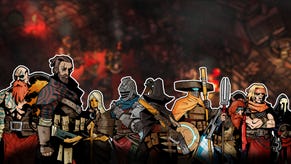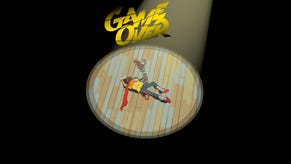Brenda Romero On Her Own Storied History, From FAQ Writing to Empire of Sin
At Gamescom 2019, we catch up with industry legend Brenda Romero to learn about her upcoming Prohibition-era set strategy game.
This article first appeared on USgamer, a partner publication of VG247. Some content, such as this article, has been migrated to VG247 for posterity after USgamer's closure - but it has not been edited or further vetted by the VG247 team.
Brenda Romero has been working in this industry since before I was born. She's incredibly cool, calm, and collected, and when we shake hands before our interview, my anxiety and the background screeching of Gamescom fades away.
That's the vibe Brenda Romero gives off as soon as you meet her. Having worked on the Jagged Alliance, Wizardry, Dungeons and Dragons and Playboy game series, she doesn't consider herself "above you," no matter how comparatively inexperienced you may be. (And at 38 years and counting in the games industry, who the hell isn't inexperienced compared to Romero?) All Romero wants to do is sit and engage you in a two-way conversation, happily flipping the interview with frenetic energy, firing some questions back at you ("did you enjoy Empire of Sin? Was the tutorial ok? Do you play strategy games often?").
A mad coincidence is that 38 years ago, Romero was doing the job I'm doing right now. Well, more or less. "I was 15, a kid," she recalls. "I started as a FAQ, believe it or not, and it was 1981, so it was pre-internet." The thought of writing guides as a job without the internet makes my brain hurt.
"If you got stuck in Wizardry level one for example and you don't know how to get to level 10, you would call the Wizardry hotline, and I would say 'hello, Wizardry hotline' and you would say 'I can't get to level 10 on Wizardry,'" Romero explains. "And I would say 'ok so you need to find the dark area. Go all the way to the end of the dark area and there's an elevator that'll take you all the way to level four.' So if you got stuck in the game you would call me and I would give you the answers."
Romero might have started as a FAQ writer at Sir-Tech, but she quickly ascended to doing jobs including "testing, product development, management, and then ultimately looking at third-party titles." That role then developed into writing for games, which then transformed into a design position. "I basically never left, and I'm still yet to really get a proper job," Romero chuckles.
Playing games might not be universally seen as a "proper job" (as I'm sure just about everyone in this industry can attest to), but Romero's career doesn't end at game development by any means. Google her right now and you'll see TED talks, you'll see activism with the International Game Developers Association, and you'll see books. One of these books, Sex in Video Games, came about from Romero's research while developing the two Playboy: The Mansion games in the early 2000's.
"It comes up periodically," Romero says of the two Playboy games. "People like to bring it up because they're like 'you made a what?'" Romero is an outspoken supporter of diversity around the games industry, but she says that sometimes the games will be brought up in the context of "how can you possibly argue for diversity and representation of women, and also have made that game?", to quote her directly.

Romero admits that there are some "right things and wrong things" about that argument. "Women can like sex too, right, it's not always a hetero-normative world," she says. "But then on the flip side I do think that that is using women expressly for the purpose of ornamentation, and if I had to make that game right now, probably not. But you learn more from the ones that aren't your best games than you do from the ones that are really good."
Although game developers might be the "last group of people" Romero would go to for exploring sexual content in any medium, Empire of Sin, her upcoming strategy game with Romero Games, won't shy away from the subject. Gang warfare is rife on the streets of Chicago, as each rival faction battles for control of speakeasies and brothels in an attempt to establish their own empire.
It's clear that all 26 people behind Empire of Sin, Romero included, have put a ton of time and energy into nailing the Chicago setting. There's even a full-time intern at Romero Games whose sole job is to write newspapers from the era. "He researches what happened in this month in this year, and he writes newspapers," Romero tells me. "So if you go to the newsstand in a game and purchase a newspaper, depending on what time it is you're going to get that news." But Romero Games isn't afraid to mess with the historical setting for the benefit of the game, and the audience. For instance, there's Stephanie St. Clair, a New York-based mob boss that Brenda Romero has transferred to Chicago in her "alternate history" for Empire of Sin.
Perhaps one of the main reasons Romero transferred St. Clair to Chicago for Empire of Sin has to do with wanting to offer a diverse range of characters. St. Clair was a black American working in Harlem. "[It's] unbelievably f**king important that you can play as a black boss; you can play as a black female boss. It was important to me that if you're Latino you can play as a Latino character, or if you're a Native American you can have a Native American character," she says. "So someplace, somehow you can see yourself in the game, no matter who you are."
Empire of Sin itself is a tactical-action, turn-based game. You view your gangsters and the opposing enemy mobsters from above, taking turns to move them around the tiles that make up the city of Chicago. To answer Romero's question of whether I liked Empire of Sin, I thoroughly enjoyed my time with it, even as "someone who's rubbish at strategy games," I admitted to her.

I was pleasantly surprised at the cast of characters on show for the Empire of Sin demo. True to Romero's word, you're not locked into the archetypal white gangster as your player character. Empire of Sin let me choose between playing as a black, brown, or white man or woman, each with their own unique skills and abilities. (For example, establishments owned by Alphonse Capone are less likely to be attacked by rival gangs.)
Empire of Sin has you as a rookie upstart in Chicago, looking to swim with the big fish and make a splash in the mob-run city. To that end you'll need to strike out against rival factions, trying to wrestle bars, clubs, and safehouses away from other gangs and bring them under your control. You're trying to grow an empire after all, but so is every other mobster in Prohibition-era Chicago.
What grabbed me about the demo was the busywork. In between shootouts and brawls, there are subtle undertones of a management sim with Empire of Sin. You need to keep your establishments around the city beyond the outstretched claws of rival factions, but you also need to ensure sure they bring in enough money to keep you in business.
So do you spend your accumulated money on bolstering up the defences of your club, or do you instead splash your cash on making the interior as fancy as possible? Of course a fancy interior won't do much for protection when a rival gang comes knocking, but armed guards won't be so welcoming to potential customers.
Empire of Sin might not be the first strategy game Romero's ever worked on—she was a designer on Tom Clancy's Ghost Recon: Commander in 2012—but it's definitely her most ambitious game in years, perhaps even ever. Romero is bringing almost four decades worth of experience to bear with the mobster tatics game, and her veteran knowledge is certainly making Empire of Sin one of the more fascinating games to watch for 2020.













